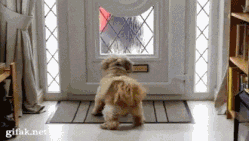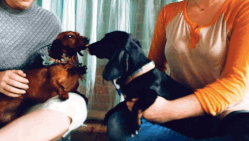If you're a dog owner, you're probably aware of the inherent challenges in finding your dream rental home with Fido in tow.
The phrase "no pets allowed" has probably put an abrupt end to more rental listing love stories than you care to admit, and once you've finally secured a pet-friendly home-sweet-home, the last thing you want to do is put it in jeopardy by being a lousy neighbor, and noise, particularly of the barking dog variety, is a fast track to being just that.
Often, dogs who are peaceful angels when you're home can let loose with a barrage of barking once you're out the door. What's more, fixing a problem that only seems to occur when you're not around can be challenging, to say the least. Challenging, but certainly not impossible.
Here are a few ways to stop the yapping and keep the peace in your new abode.
 Abolish Anxiety
Abolish Anxiety
Many dogs develop separation anxiety at the mere thought of their owner's departure, and this anxiety can be expressed by howling, barking and destructive behaviors around the home. Separation anxiety can be especially hard for newly rescued animals that are getting their first taste of a stable home life. The main goal is to desensitize anxious dogs and get them to understand your leaving and returning are normal and nothing to be afraid of.
Don't make goodbyes or returns a big deal. In fact, it's best to pay no attention to them at all during arrival and departure —no treats, no fanfare, no hugs and kisses. If your dog is particularly clingy, you can "practice" leaving home, or even leaving the room, for increasing increments of time. Start by stepping out the door for 30 seconds, a minute, five minutes and so on. Normalize any cues around leaving the house by picking up your keys and putting on shoes or coats randomly without actually leaving.
If all else fails, speak to your veterinarian about anxiety. It may sound absurd, but a short-course of anti-anxiety medication can do wonders for anxious pets, especially for dogs acclimating to a new home.
 Ditch Distractions
Ditch Distractions
Some dogs are inclined to get vocal when they can see the goings-on in the neighborhood. If the postman's daily visit or an errant squirrel sends your pup into hysterics, consider blocking their view when you're away from home. Simple things like closing curtains and blinds or moving furniture that gives your pet a vantage point can go far in preventing an outburst.
 Expect Exercise
Expect Exercise
Too much energy in a dog stuck home alone for hours is a recipe for disaster. While your inclination may be to save the day's big walk or dogpark outing for the end of the day, wearing Spot out in the morning is the far better approach. After a full night's sleep, your dog will be ready for some activity, and this can be a great motivator for getting yourself a little morning exercise as well. Keep in mind that, while it varies by breed and age, most dogs need about 30 minutes to two hours of exercise each day for optimal health and well being.
 Banish Boredom
Banish Boredom
Even with regular morning walks, your dog is likely to start feeling perky again by late afternoon. A bit of boredom after a morning nap will have them looking for trouble, perhaps in the form of barking for attention. Interactive toys, like a Kong stuffed with peanut butter or puzzles that dispense treats when solved, are great to keep your pooch occupied. An appointment with a dog walker is another way to make sure boredom doesn't lead to disaster. Giving someone access to your home can be daunting, so it's smart to thoroughly research your potential caregiver. Your veterinary office is a great source for pet care leads, as is Pet Sitters International.
 Enlist Experts
Enlist Experts
When a dog walker isn't enough, a qualified dog trainer or behaviorist can be a godsend in dealing with a chatty canine. A trainer can equip you with valuable tools to address a vocal dog or guide you through the process of crate training, which many dogs respond well to. At the very least, a professional trainer can assure you that a barking problem isn't insurmountable and can be fixed. Ask your veterinarian for a recommendation or check out sites like the Certification Council for Professional Dog Trainers or the Association of Professional Dog Trainers that can provide information on trainers in your area.
 Reassure Residents
Reassure Residents
Be sure to communicate with your neighbors about barking and what you're doing to address it. Provide your phone number and encourage them to reach out if your pup is acting up. Introducing your dog to neighbors can help your pooch recognize fellow "pack members" and acclimate to their comings and goings. If you're open and honest with fellow residents and making clear steps to address the issue, most neighbors will be patient during what is, hopefully, a short-term issue.
 201 366 8692
201 366 8692









